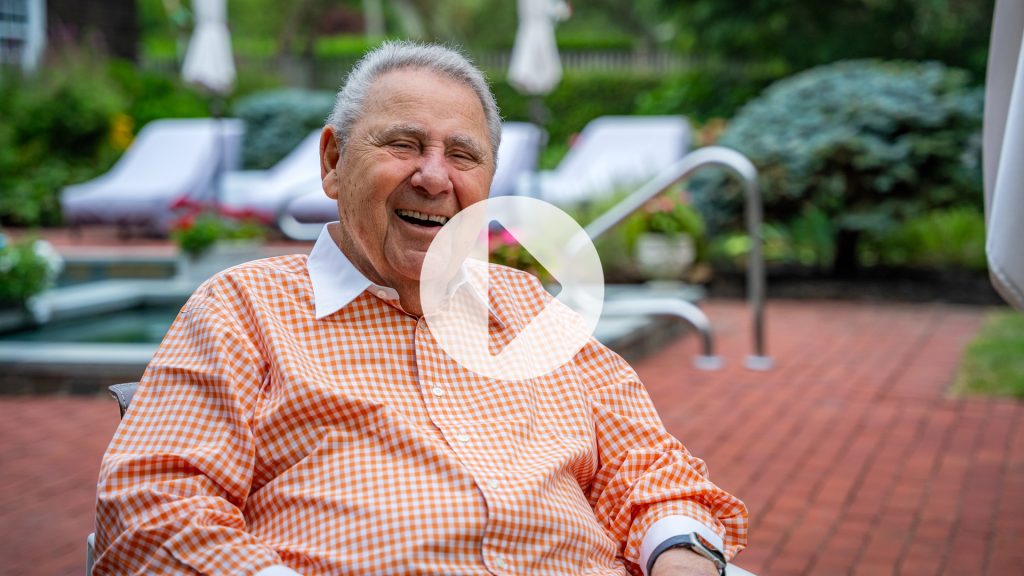“It takes conviction, confidence, and a willingness to take a risk.”
The Dean’s Distinguished Alumni Award recognizes both “extraordinary achievements and contributions” made by alumni. This year’s recipient believes the two are inseparable.
“I’ve had an extraordinary career,” says Bernard ‘Bernie’ Kossar ’53, L’55, and he credits Syracuse University and the College of Law. “The combination of a strong business undergraduate degree, especially focused on accounting and finance, together with a solid legal education, equipped me for almost anything and everything. It may sound silly, but I have a sense of a proprietary interest in the institution. I owe it. And that’s one of the reasons for my continued engagement.”
Kossar’s engagement with his alma mater over decades has significantly impacted countless students (in ways of which they are not even aware), and that’s because he has built trusting relationships with university leaders and looked out for opportunities to fill unmet needs. “These needs are opportunities and the more opportunities we can seize, the better the school will be,” he reasons.
Kossar serves on the University Board of Trustees Advancement and External Affairs and Finance Committees as a Life Trustee participant. He was a Voting Trustee from 2000-12 and chair of the Budget Committee from 2003-06. In 2013, he received the Dritz Life Trustee of the Year Award. Kossar was also a member of the Whitman Advisory Council, serving as its Chair for 13 years. He is a member of the College of Law Board of Advisors and a member of the Society of Fellows. Kossar was a 1996 recipient of the University’s Outstanding Alumni Award.
“Bernie has a keen business intellect,” says College of Law Dean Craig Boise. “He’s very much a cut-to-the-chase, candid person.” Boise points out that Kossar brings a track record of building successful businesses—taking an idea and creating companies that are household names with international reach—to any advisory role. “One of the things Bernie stresses is that higher education should not be viewed as something apart from the business world. In the end, law schools have customers and products. He would ask me questions like, how can we generate revenue through new programs? What’s the scope of the potential market? How can we make law school a place that would be more of a launchpad to the business side of law and legal practice?”
Kossar did not foresee a corporate career when he first went to law school. After graduating and passing the bar, he went to the Marine Corps with a two-year active commitment and six-year reserve commitment. Returning to civilian life after two years was difficult. “There was no career placement office at Syracuse. I had no connections,” recalls Kossar. “I would chase the want-ads in the New York Law Journal, make calls, write letters, modify my resume to accommodate each solicitation, and once in a while, I received a call to come to an interview. In one case, after being rejected I offered to work for free for six months. He didn’t take me up on it. I couldn’t even get hired for nothing!”
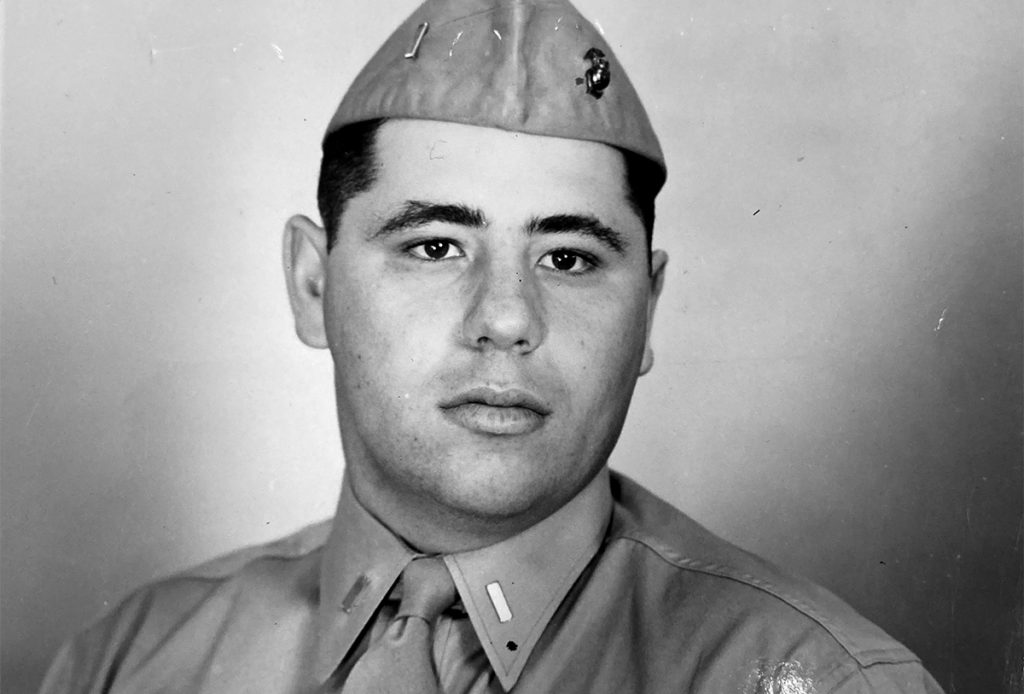
Through a family friend, Kossar was introduced to Morris Friedman, one of the leading tax attorneys in the country, a prominent tax law professor at New York University, and contributor to textbooks used in most tax law classes. Kossar worked for Friedman for 18 months and, with his encouragement, went on to earn his LL.M. from NYU in tax law. Equipped with an almost complete LL.M. curriculum, Kossar interviewed with three firms and received three job offers.
Kossar accepted the offer made by the law firm of Van Buren, Schreiber, and Kaplan. “We didn’t have specialists at the firm. We did everything. I got deeply involved with representing the national chain Franklin Stores Corporation (NYSE), handling real estate, registration filings, SEC work, labor problems, and contract negotiations,” Kossar said. Ultimately, the CEO of Franklin Stores asked Kossar to come on board full-time. “I didn’t sleep that night. With a wife and two babies to consider, I was facing unchartered waters. It takes conviction and confidence and a willingness to take a risk. With my wife Carol’s encouragement and support, I made the decision. I crossed over and one of the conditions was that my firm was to continue under their normal retainer.” Clearly, relationships and loyalty remained most important to Kossar—a running theme in his business career and continued engagement with Syracuse University.
“My grandfather instilled in me that it’s all about the people that surround you. He cared about everyone, every employee, accountant, and lawyer,” says Michael Kossar ’13, who was a finance major at the Whitman School and now serves with his grandfather as co-managers of Kossar Family LLLP and Millennium Partners LLLP, two private investment partnerships. “He may have started as a caboose on the train, but he ended up at the head of the train and everyone followed him. He taught me about long-lasting relationships, forging friendships through business. His story still incentivizes me every day.”
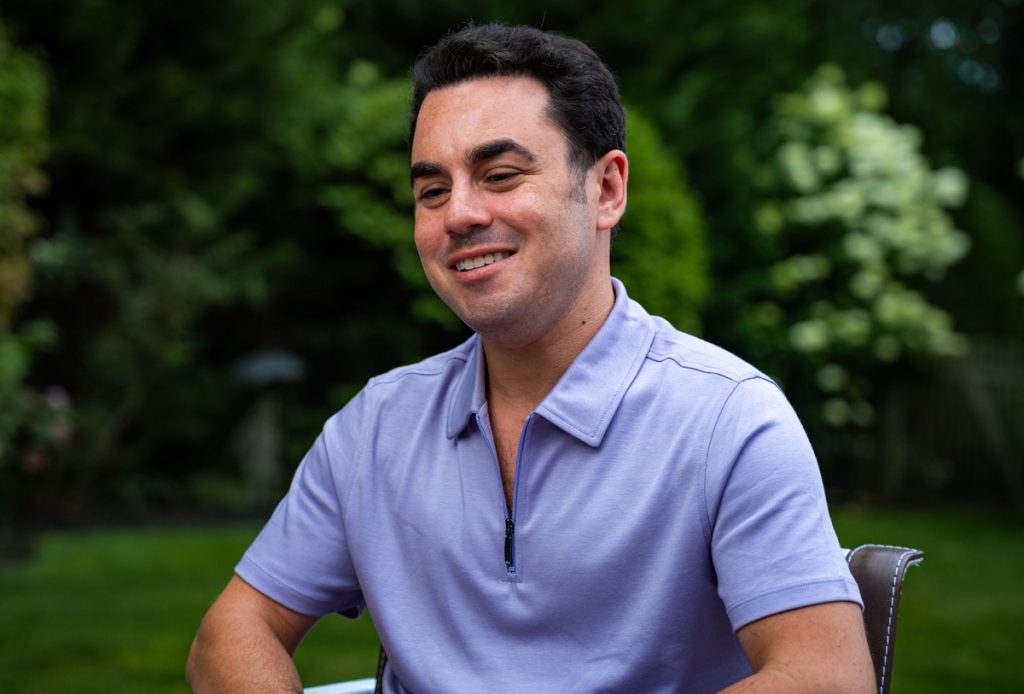
My grandfather instilled in me that it’s all about the people that surround you. He cared about everyone, every employee, accountant, and lawyer. He may have started as a caboose on the train, but he ended up at the head of the train and everyone followed him. He taught me about long-lasting relationships, forging friendships through business. His story still incentivizes me every day.
Michael Kossar ’13
It’s that sort of enthusiasm, along with a sense of confidence and comfort with risk, that Kossar hopes to instill in other Syracuse graduates, especially those who choose a legal career. In the countless hours that law students spend studying in the Kossar Reading Room in the Dineen Hall Law Library, they are acquiring some of the skills they will need to be successful.
“You can memorize the laws, but a good legal education, especially one grounded in the case study method, gets you to think,” says Kossar. “It’s so important to understand both sides of the argument, that both sides have merit. There is no pointless view; there are different viewpoints and you have to understand the rationale of multiple positions. In law school, you learn how to think, how to evaluate, and come to an informed judgement. The greatest thing you get out of law school is learning how to take an analytical approach to a problem, to tax your brain to get to the depth of the issue, and understand it.”
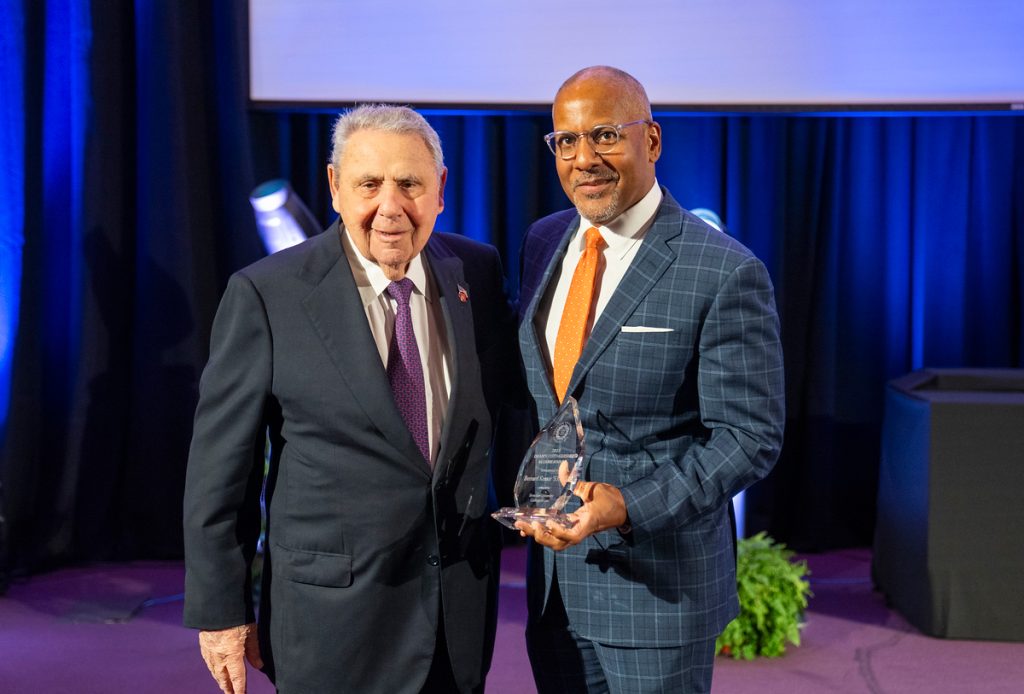
Kossar’s analytical thinking is what Dean Boise appreciated most as they discussed ways to improve the College of Law’s financial outlook shortly after Boise arrived in Syracuse. “Bernie would often ask me about revenue and expense cycles, challenges to enrollment and new programs,” says Boise. At the time, the College relied heavily on subsidies from the University. “The College had to find ways to cut the deficit; to get the University to be patient with us and supportive; to have the law school be fiscally responsible and attract extraordinary students and prepare them responsibly to pass the bar exam,” says Kossar.
Kossar described his approach as a three-legged stool looking at facilities, faculty/curricula, and student body.
- “We had to find ways to provide the school with the absolute state-of-the-art facilities, including up-to-the-minute technologies, all the tools necessary for students to achieve,” says Kossar, who likes to contrast today’s facilities with his own experience in Hackett Hall, a “dilapidated” building in downtown Syracuse. During his last year in law school, Ernest I. White Hall opened on campus (“It was such a step up, we all thought we had died and gone to heaven!”). His was the first law school class to graduate from White Hall.
- The College needed to continually refresh its curriculum course offerings and bring in new faculty to support a broadened curriculum that would address current issues in technology breakthroughs, government regulation, first amendment rights, and constitutional law. “I am a product and advocate of the 3+3 accelerated dual degree with the Whitman School, and also support the joint J.D./masters in finance. The College has done an outstanding job in online education which is an excellent source of additional revenue. The law school had serious fiscal problems that have been overcome and I can say today are manageable, and I give a great deal of that credit to the Dean. He’s done very well on fiscal responsibility.”
- “There’s an imperative to keep improving the quality of the students,” says Kossar. “It’s very important that we elevate the standards for each newly admitted class. Importantly, each class should have a few very special lead students that I call the pacemakers. I believe that other students will try to keep pace as best they can with the pacemakers and that will elevate the whole class.”
During his own experience in law school, Kossar credits his small four-person study group with keeping him focused through graduation and beyond. Kossar, Albert Makay L’55, Herb Mendelson L’55, and William Maloy L’55 pushed each other through countless study sessions, most of which took place in Kossar’s apartment. He was the only one of the group who was married. His wife, Carol Karetzky Kossar ’53, earned her degree at the College of Arts & Sciences. They married while he was in law school and she became the “den mother” for the study group, providing food and sustenance to allow them to keep “grinding and grinding.” All four continued their studies together beyond graduation to prepare for the bar exam, living together and studying for an entire month. They remained friends throughout their careers. Kossar, who passed the bar on the first go-round, was the only one who went into corporate law and the business world. And he credits Carol for being a true partner, supportive through it all, and critical to his success. They’ve been married for more than 70 years.
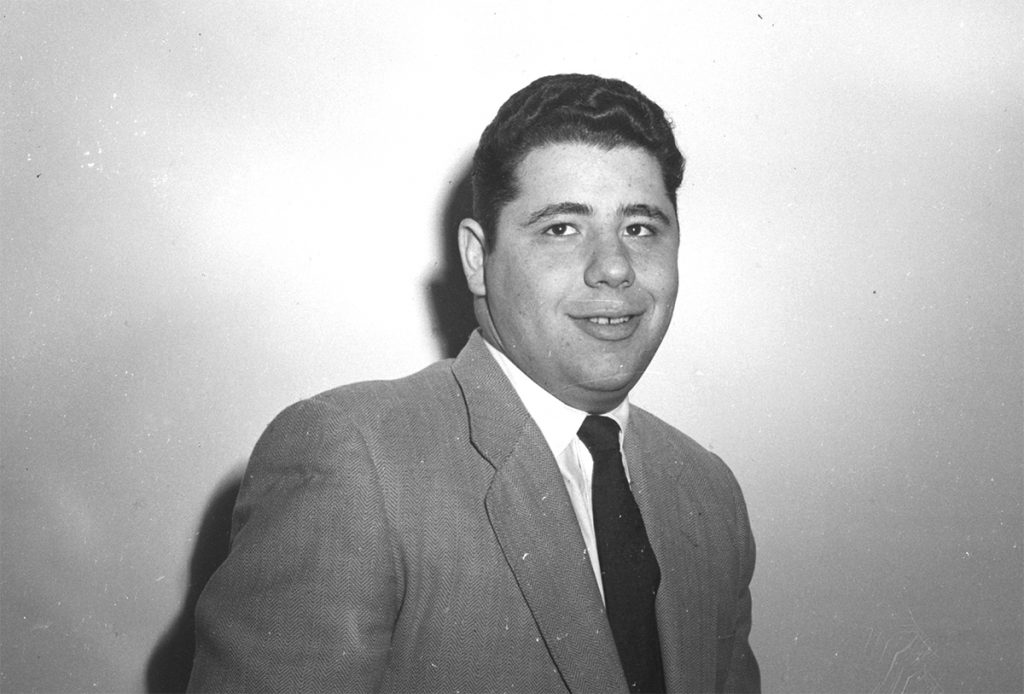
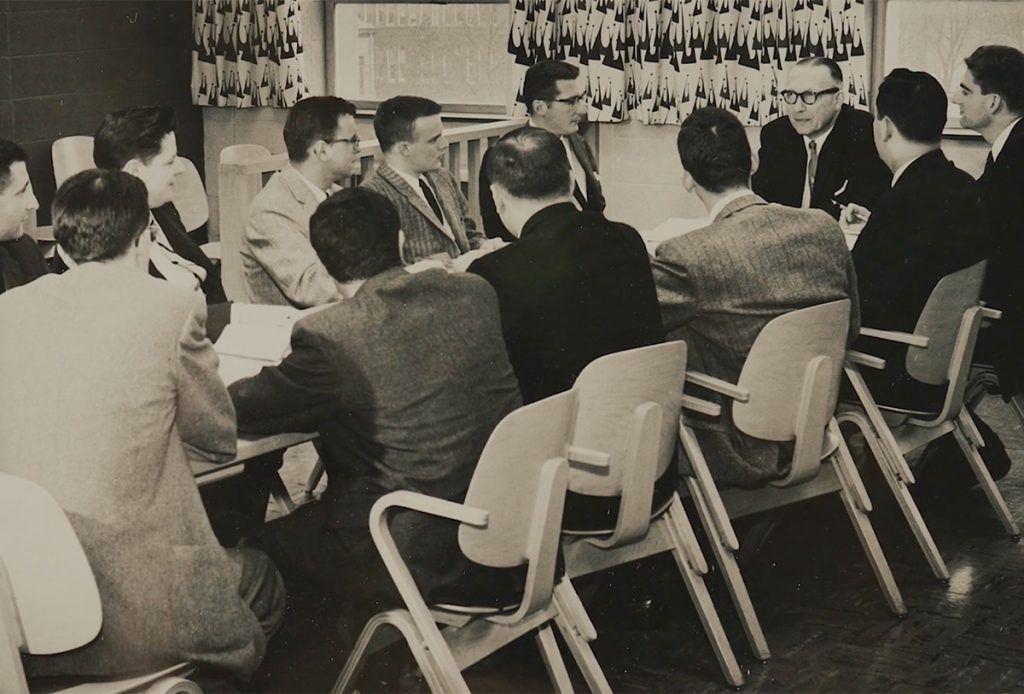
Kossar believes that preparation for a career in law, including the cost of law school, should be viewed from an investment perspective. “It’s a major investment and I would like them to think of law school as their first entrepreneurial venture. You want that venture to succeed. You’ve got to put everything your body and mind are capable of into those three years, to make the most out of it. You need to trust in yourself and have confidence in your abilities. And perhaps most important: you need inspiration and perspiration. You should be inspired and work hard.”
Kossar noted one Syracuse faculty member in particular who inspired him with his knowledge, teaching style, and generosity. Joseph Hawley Murphy was Kossar’s tax, wills and estate law professor when the first comprehensive revision of the federal income tax system was introduced. When Murphy was asked to write a major article about The Internal Revenue Act of 1954; he asked two students—Lewis Glazier L’54, a 3L, and Kossar, a 2L—to assist him. Instead of simply noting those students in a footnote, Murphy included their names as co-authors of the article. Kossar says Murphy “had significant influence on my determination to pursue tax and estate work.”
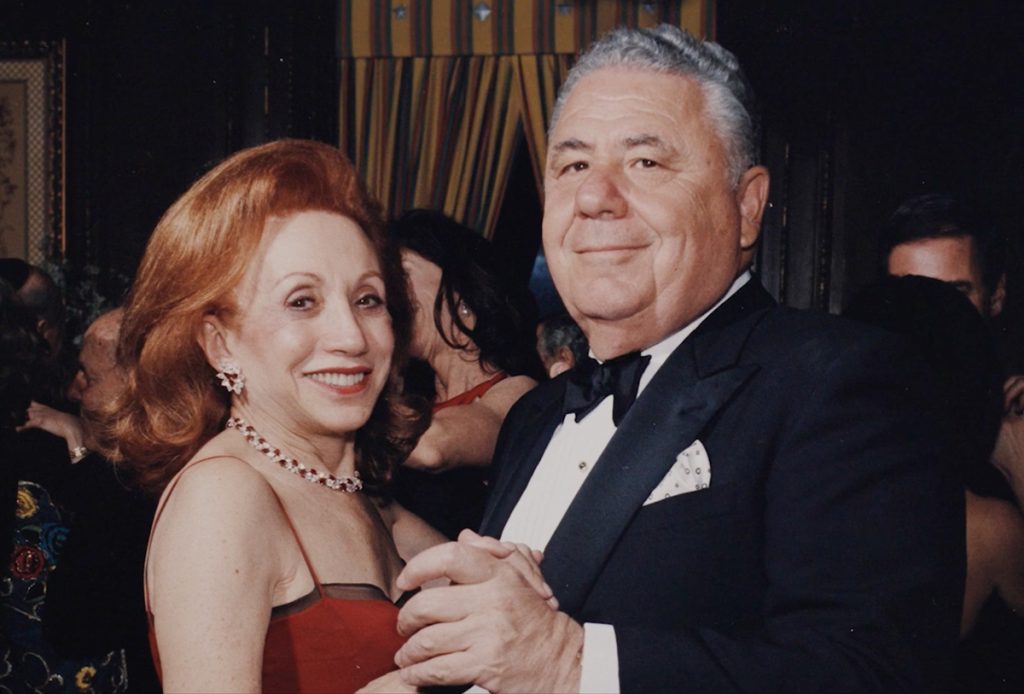
Kossar’s own work ethic laid the foundation for his success in business. His legal acumen and business sense eventually earned him the title and responsibilities of President and Chief Operating Officer (COO) of Franklin Stores, a New York Stock Exchange (NYSE) listed company which operated 278 retail apparel and discount department stores throughout the United States. After his tenure there, he strengthened other corporations, becoming the President and COO of Vornado, a NYSE listed company engaged in retail and real estate holdings. He was Special Advisor to the Chairman and CEO of Great Atlantic & Pacific Tea Company before joining W.R. Grace & Company as Senior Vice President.
At W.R. Grace & Co., Kossar served as senior vice president of seven retail companies. During this time, Kossar created HQ Home Quarters Warehouse, which he eventually purchased from W.R. Grace with Grace continuing as a minority partner. As president and chief executive officer, Kossar negotiated a highly profitable sale of HQ in 1988. That same year, he founded OW Office Warehouse Inc., an office supply superstore chain, with W. R. Grace participating as a minority partner. J. Peter Grace himself served on the boards of both HQ and OW. Six years later, OW was sold to OfficeMax at a substantial profit. Thereafter, Kossar founded Millennium Partners, LLLP, a private investment partnership focused on public and private investment opportunities.
Now, Kossar works alongside his grandson Michael, managing the family investment funds and passing on the secrets of business success. “Every retail business has bricks and mortar, merchandise and people. But everybody doesn’t have the same quality of people,” says Kossar. “That’s the one ingredient that differentiates every company, and the one ingredient that can ensure success. It’s all about leadership—how you treat your managers and associates, how they feel about the company culture and the work environment. I knew that executives had to truly be part of the company, and have some ownership. Further, they needed a clearly defined strategy and authority to implement that plan. That’s what differentiated my companies.”
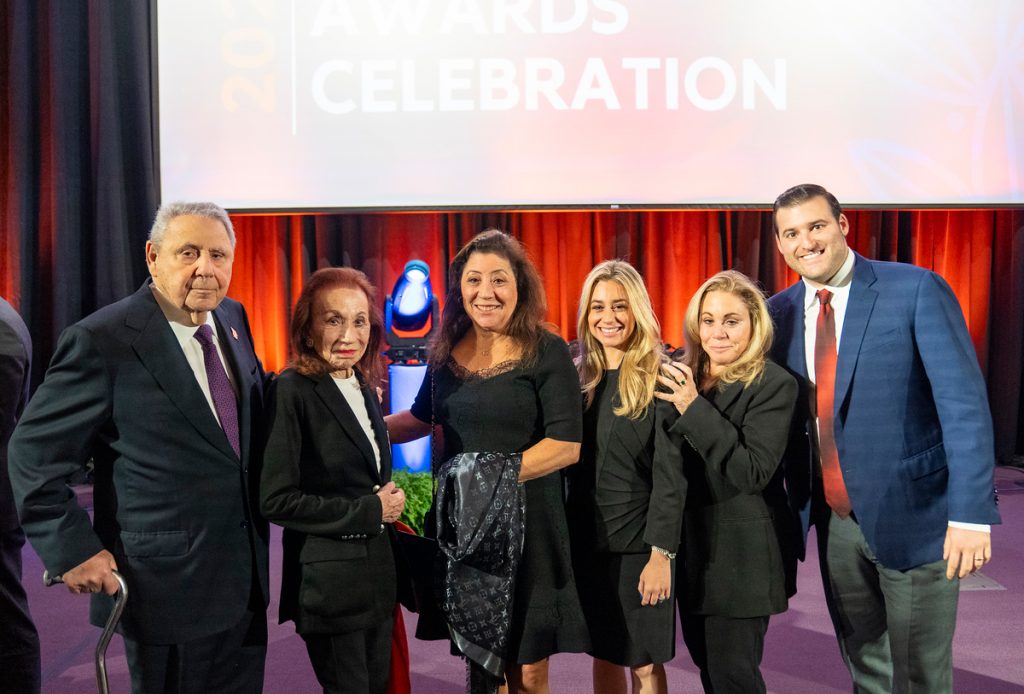
Kossar’s business successes gave him the opportunity to focus on philanthropy, directing funds to meaningful projects at Syracuse University (building funds, the reading room, the career center and executive floor at the Whitman School, and scholarships for talented and deserving students). Over the decades, he has contributed to the dean’s discretionary funds at the College of Law, Whitman, Arts & Sciences, and Newhouse. In Tel Aviv, Israel, he and Carol saw a need to support aging Israelis and seized the opportunity to build what is now the Kossar-Karetzky Senior Center. “Our multiple visits to the seniors, most recently in 2019, have been most gratifying,” says Kossar. “If you do it right, your charity will give you much satisfaction. It gets into your heart and the marrow of your bones. You get back more than you can ever give.”
For Bernie, Carol and the Kossar family, generosity and gratification are two sides of the same coin: “I think philanthropy is a selfish endeavor. I have derived more pleasure and more satisfaction and more good feelings from some of the good things that we’ve done. I’ve had payback beyond belief.”
Now, recognized with the Distinguished Alumni Award, Kossar says he feels exceedingly grateful: “There’s no greater honor than to be recognized by your alma mater…and be fortunate enough to live long enough to get the award!”

